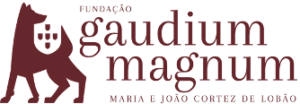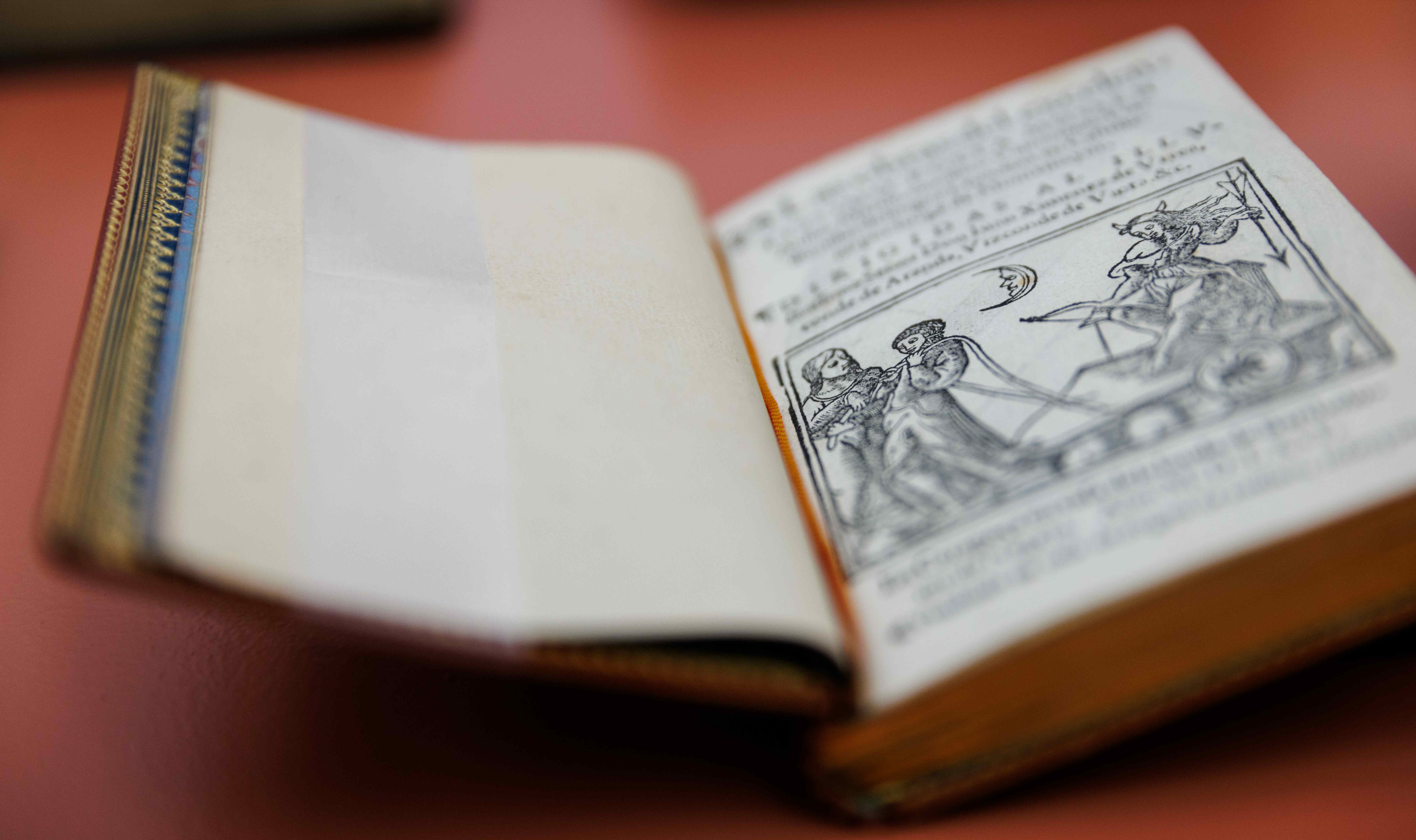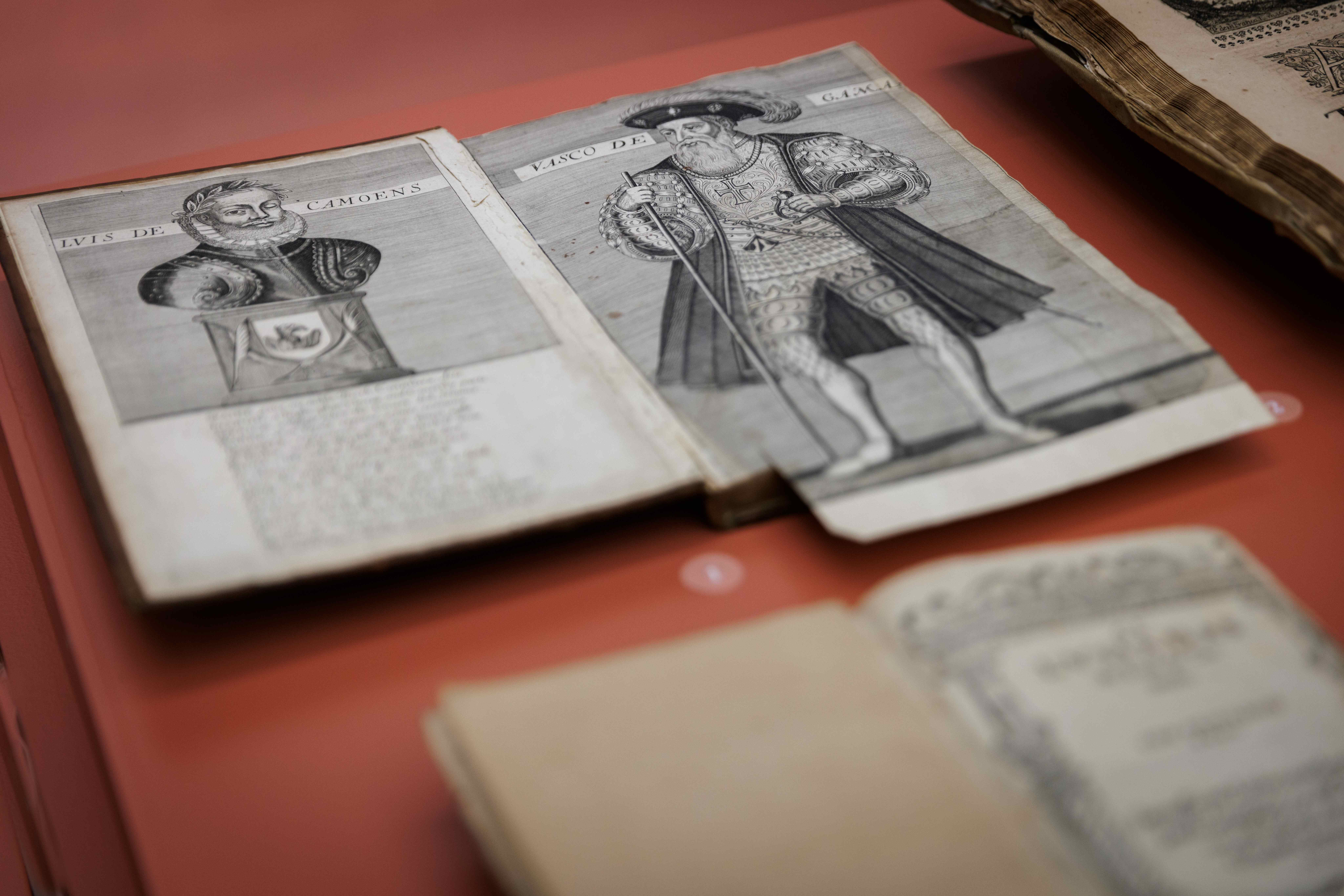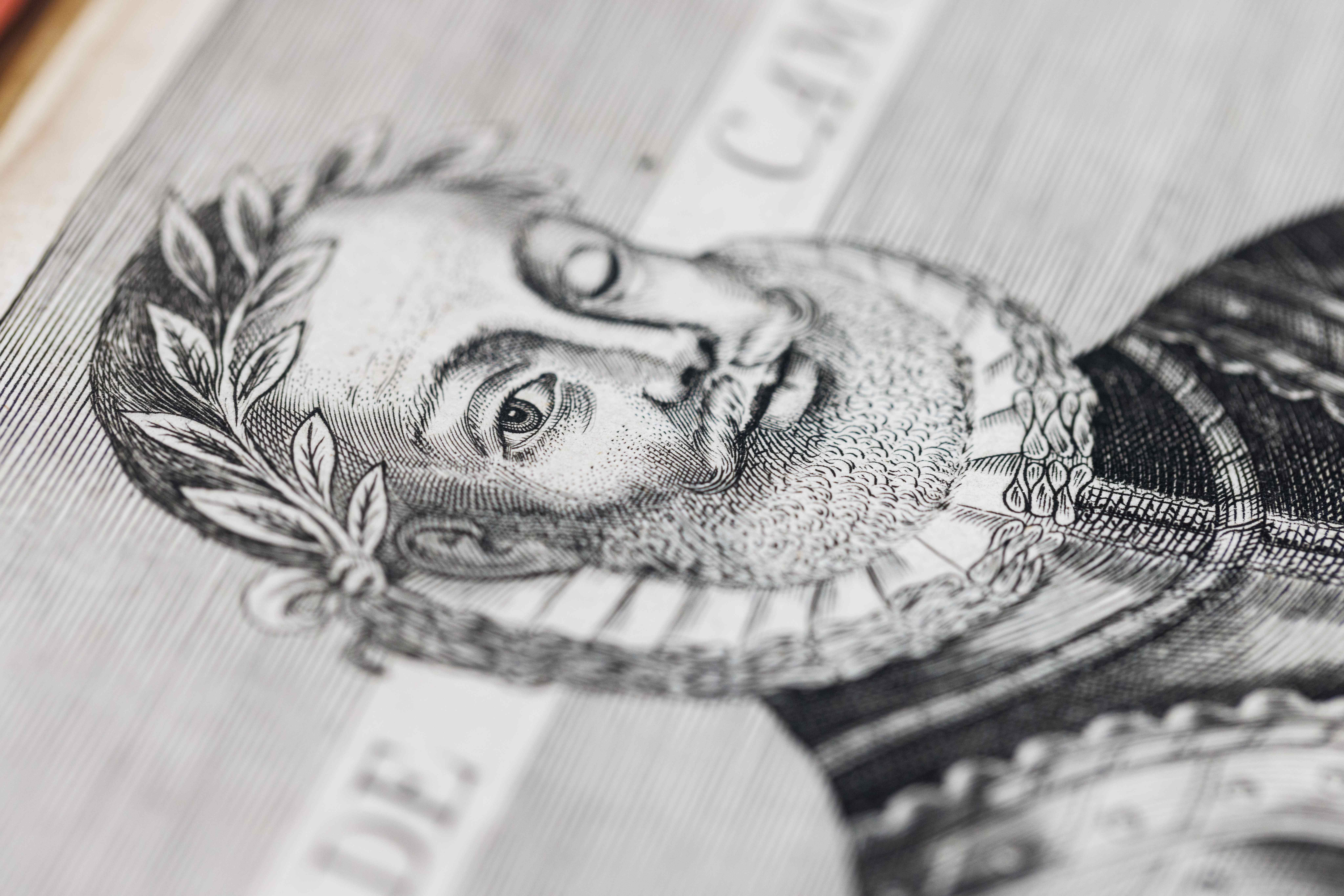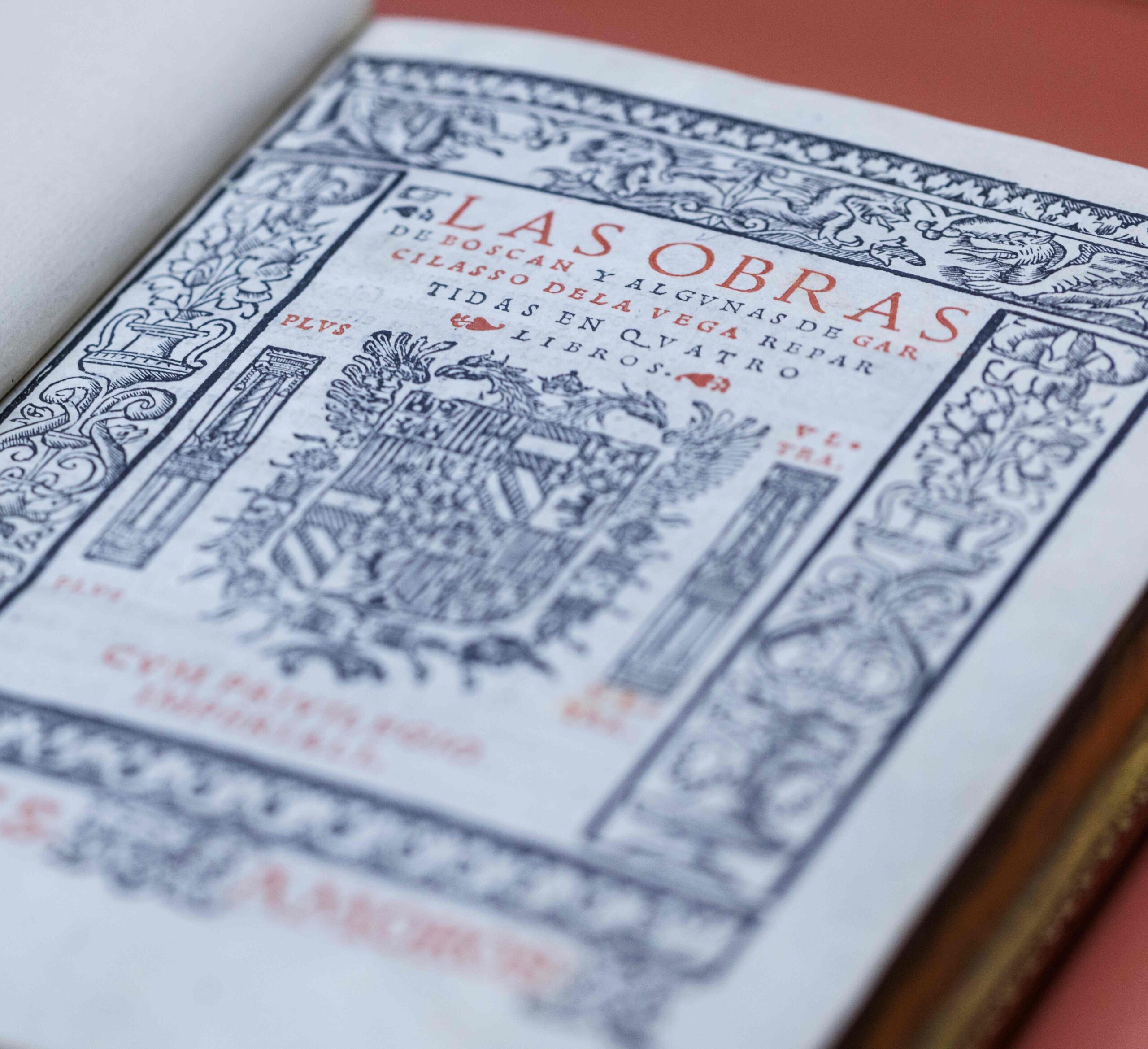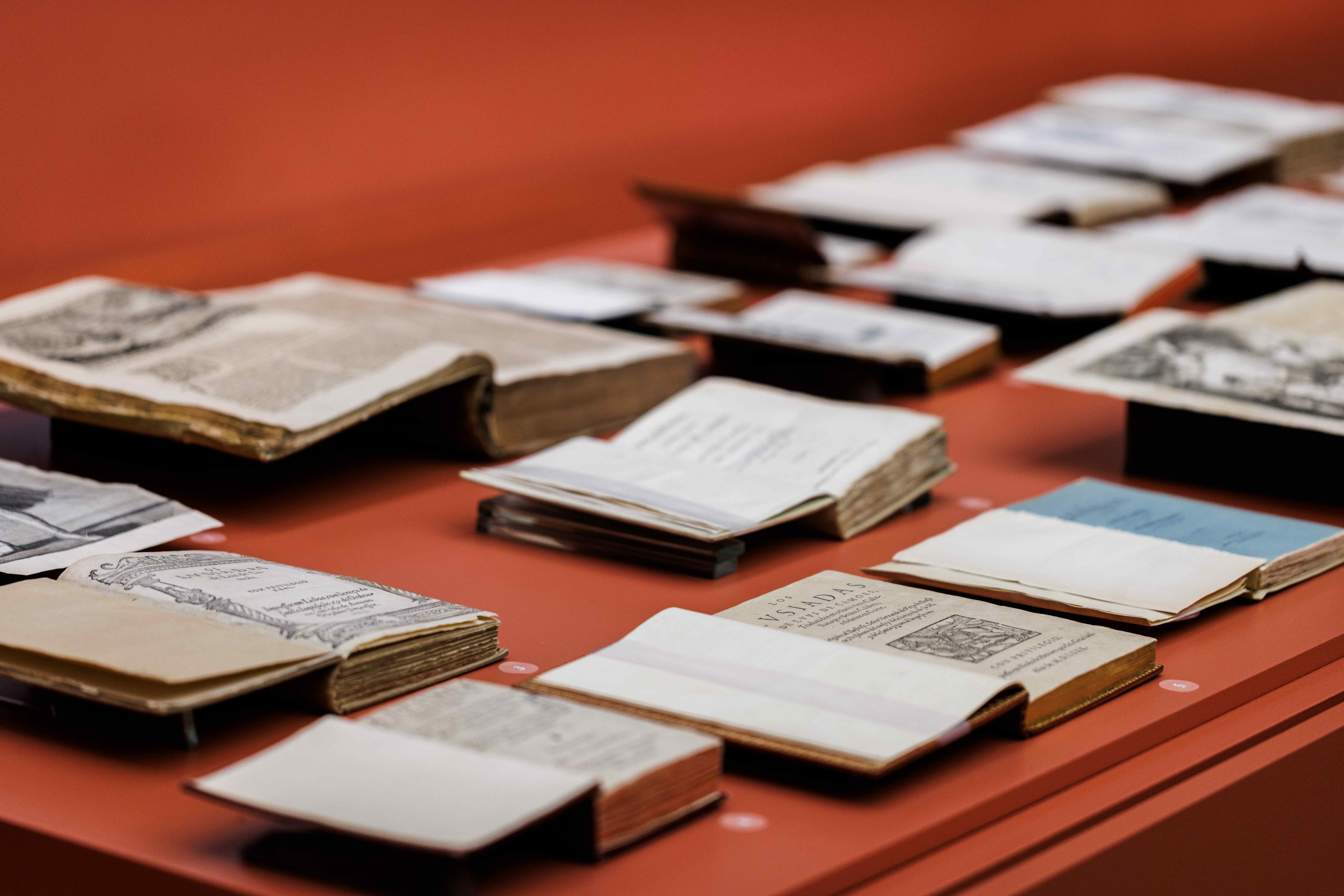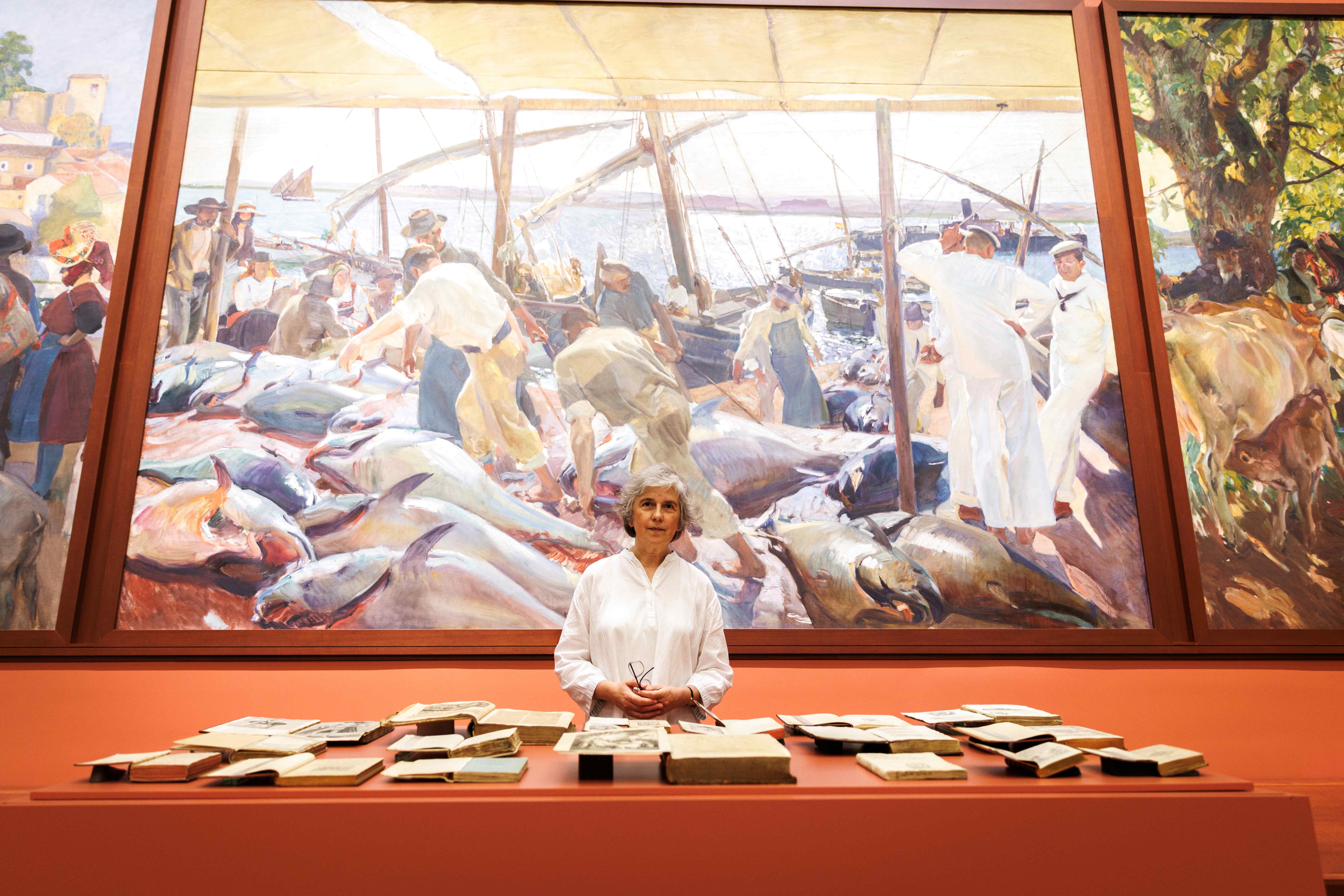“Camões: Who are you?”
A didactic and accessible exhibition for visitors unfamiliar with Camões but eager to learn about his life and work. The information is presented at the courtyard kiosks, drawing inspiration from a passage in “Luísadas” (V, 49), highlighting one of the poem’s central themes: humanity’s insatiable thirst for knowledge.
The exhibition represents the final component of the multi-year scholarly collaboration between the Hispanic Society and The Gaudium Magnum Foundation in celebration of the 500th anniversary of the birth of one of the great luminaries of Portuguese letters. It will be on view from June 26th until early September, 2025. See below for translations to Portuguese and Spanish.
Portuguese:
- Luís de Camões (c. 1524-1580)
“Quem és tu?” Ao endereçarmos esta pergunta ao poeta Luís de Camões, não deixaremos de a fazer a nós mesmos. Na verdade, Camões lembra-nos quão importante é sermos curiosos. Em sintonia com filósofos como Aristóteles ou Séneca, o poeta ensina-nos: a ignorância alimenta o medo; naturalmente, todos os seres humanos desejam conhecer.
O século XVI foi um tempo de rápidas mudanças, nas quais Portugal desempenhou um papel decisivo. Ligações marítimas proporcionaram novas oportunidades de contacto e de comércio; novas relações políticas foram estabelecidas e novos impérios se formaram; desenvolveram-se as ciências – matemática, astronomia, geografia, farmácia, medicina –, a par do debate epistemológico. Se os autores clássicos e as suas obras constituíram objecto de profunda admiração e tantas vezes foram imitados neste período de Renascimento, é igualmente certo que emergiu então um nítido entusiasmo pelos modernos. Pois não era possível descobrir e saber muito mais do que gregos e romanos tinham conseguido?
Uma aguda consciência da amplitude e da diversidade do mundo esteve subjacente ao processo de transformação da cartografia. Na produção de mapas, florescente nesta época, a América – um novo continente – passou a ser considerada. Além disso, a costa de África surgia completa, do mesmo modo que à Ásia era dada mais rigorosa extensão. Contra as convicções de Ptolomeu, a navegação entre os oceanos Atlântico e Índico mostrava-se possível. O impacto desta metamorfose seria imenso: a globalização estava lançada.
- “Por mares nunca dantes navegados”
Camões escolheu a primeira viagem marítima que ligou Lisboa à Índia, sob o comando de Vasco da Gama (1497-1499), como o principal assunto da sua obra mais famosa: Os Lusíadas. Impresso em 1572, o poema épico foi concebido como um acto de emulação da tradição clássica, nomeadamente da Eneida de Virgílio. A história podia ocupar o lugar do mito: “Cesse tudo o que a Musa antiga canta”.
A “antiga Musa”, no entanto, é fundamental para Camões, já que a relação com os textos antigos confere sentido ao seu poema. O herói da Eneida virgiliana viaja de Tróia (actualmente, território turco) até Itália, atravessando o Mediterrâneo. Ao invés, os “barões assinalados” (repare-se no uso do plural) cruzam o mundo “por mares nunca dantes navegados”.
N’Os Lusíadas, Camões concilia a narrativa desta viagem com a narrativa da história de Portugal. O poeta fala-nos do passado e celebra a busca do caminho marítimo para o Oriente, sem deixar de criticar a injustiça e a ganância. Camões também comenta o tempo presente, e, entre os conselhos dedicados ao rei e aos lusitanos, há raiva e desgosto, motivados pela geral ingratidão ou pela insensibilidade de potenciais patronos. Não desiste o poeta, porém, de buscar a esperança; euforia e melancolia coexistem no seu canto. Todas estas características fazem a força simbólica d’Os Lusíadas – um pequeno mundo dinâmico, heróico, dramático e lírico, pleno de variedade e contrastes, quando não de fundas contradições.
- Words, words, words
Na composição d’Os Lusíadas, terá tido algum peso a longa experiência de Camões, viajante e soldado. No seu “caminho de vida”, crê-se que o poeta passou um curto período no Norte de África e vários meses na ilha de Moçambique. Além disso, viveu aproximadamente duas décadas na Índia (1553-1569), circulando porventura até Macau. Acima de tudo, porém, na construção da obra épica, influiriam as suas vastas leituras – sagradas e profanas, em latim ou em língua vernácula.
No coração do poema (canto V), Camões criou a personagem do gigante Adamastor – um colosso, que assusta os portugueses num ponto crucial da viagem: a passagem do oceano Atlântico para o Índico. “Quem és tu?” é a questão que Vasco da Gama (com “as carnes e o cabelo” arrepiados) dirige a Adamastor. Este impulso gnoseológico lembra a sentença difundida por Séneca numa das suas Cartas a Lucílio (104): “Não é porque as coisas são difíceis que não ousamos; é porque não ousamos que as coisas são difíceis.” Vasco da Gama atreve-se a perguntar, e a resposta de Adamastor traz consigo a revelação de uma nova realidade: “Eu sou aquele e oculto cabo / a quem chamais vós outros Tormentório”.
Adamastor explica: eu não sou senão um acidente da natureza, que as palavras, usadas sob o efeito do medo e da ignorância, transformaram num monstro. Já num outro episódio – o do Velho do Restelo (IV, 94-104) – a personagem, “de aspeito venerando” e “experto peito”, alerta: as palavras podem ser instrumentos de fraude, furiosamente violentas ou insidiosamente brandas; o discurso, capaz de mascarar, pintar ou distorcer factos, pode ser usado para nos distrair da verdade.
- Conhecimento: espanto e desejo
A identificação do herói d’Os Lusíadas foi sempre controversa: Vasco da Gama? Vasco da Gama e os seus companheiros? Os portugueses enquanto nação? O próprio poeta? Todos? O conceito de prémio devido ao comportamento heróico, em contrapartida, parece consensual.
Qual é o prémio concedido a Vasco da Gama e aos seus companheiros nos cantos finais (IX-X) d’Os Lusíadas? O acesso a uma utópica ilha de Vénus. Ora, Camões não se limita a criar uma recompensa excepcional: também adopta uma perspectiva extraordinária. Sem conflitos nem remorsos, o poeta equilibra aí a mitologia e a história, o corpo e o espírito: há tempo para o amor e para o sexo, como há tempo para a contemplação de uma miniatura da máquina do mundo, geocentricamente descrita. O acesso ao conhecimento é encarecido como uma espantosa experiência e uma chave para lúcidas escolhas.
Antes, no canto V, Camões enfatiza as maravilhas da natureza e o valor do saber empírico, junto com a importância da especulação e da teoria. Desta maneira, o poeta mostra claras afinidades com alguns dos seus contemporâneos, tais como o matemático e astrónomo Pedro Nunes ou o médico Garcia de Orta, em cujas obras (altamente cotadas e até – no caso de Orta – prontamente traduzidas em diversas línguas) a descoberta de novas gentes, novas terras, novos produtos, novos mares, novos céus e novas estrelas é exaltada.
- Para saber de cor
Luís de Camões, Sonnets and other poems. Translated by Richard Zenith, Dartmouth, University of Massachusetts, 2009, pp. 35-36.
- Amor: o canto sem fim
Na obra de Camões, o amor é um tema omnipresente e complexo, envolvendo inextricavelmente a filosofia, a poética e a arte. O discurso camoniano pode ser uma projecção de neoplatónica confiança no poder da beleza (“Aquele não sei quê, / que espira não sei como, / que, invisível saindo, a vista o vê, / mas para o compreender não acha tomo”) como chave para a perfeição espiritual. Mais comum, porém, é o discurso que destaca em Eros, não raro por entre paradoxos, os traços de um deus cruel, cego e destrutivo. Sujeito ao seu poder, o ser humano é amiúde representado como uma estranha figura marcada pela trágica consciência das suas imperfeições e dilemas, imensa e frágil, lúcida e fatalmente atraída pela desgraça.
Camões constrói um ethos impressionante, alicerçado na imitação de prestigiados modelos, antigos e modernos. Sem dúvida, o impacto de autores espanhóis e italianos – entre eles, Petrarca, Ausias March, Boscán, Garcilaso – é detectável no uso do verso decassílabo ou em géneros como o soneto ou a elegia. Ao mesmo tempo, porém, padrões ibéricos, com longas raízes na tradição poética, persistem.
Prosa e verso combinam-se no teatro e nas suas cartas de Camões. Por vezes, formas de paródia ou de inversão de códigos (veja-se o caso do petrarquismo e do anti-petrarquismo) acentuam audaciosos contrastes. Em várias cartas, por exemplo, Camões expõe, com agudeza, um mundo boémio e transgressor: brigas nocturnas, aventuras envolvendo “ninfas de água doce” (um eufemismo para prostitutas), caricaturas irónicas de figuras de Lisboa ou do ultramar.
Se Orfeu, pela capacidade de encantar através da música, é para o poeta um símbolo inspirador, Proteu, o deus dos mil rostos, não andou longe da sua memória. Diferentes faces, diferentes vozes: assim seria Camões.
Spanish:
- Luís de Camões (c. 1524-1580)
«¿Quién es usted?». Al plantear esta pregunta al poeta portugués Luís de Camões, también podríamos hacérnosla a nosotros mismos. De hecho, Camões destaca la importancia de ser curioso. Al igual que filósofos como Aristóteles o Séneca, nos recuerda que la ignorancia alimenta el miedo y que, por naturaleza, todos los seres humanos deseamos saber.
El siglo XVI fue una época de cambios veloces, un tiempo en el que Portugal desempeñó un papel importante. Las conexiones marítimas abrieron nuevas oportunidades de contacto y comercio; surgieron nuevas relaciones políticas y nuevos imperios; se desarrollaron la ciencia —las matemáticas, la astronomía, la geografía, la farmacia, la medicina— y el debate epistemológico. Si bien los autores clásicos y sus obras eran profundamente admirados y a menudo imitados en este periodo del Renacimiento, también surgió un entusiasmo por la modernidad. ¿Acaso no era posible descubrir y conocer mucho más que los antiguos griegos o romanos?
Una conciencia profunda de la amplitud y diversidad del mundo transformó la cartografía, y la confección de mapas floreció a lo largo del siglo XVI. En estas representaciones aparece un nuevo continente, América. Además, se completa el contorno de la costa de África y se da una forma y extensión más precisas a Asia. Contrariamente a lo que creía Ptolomeo, era posible navegar desde el océano Atlántico hasta el océano Índico. El significado y el impacto de esta metamorfosis serían enormes: la globalización estaba en marcha.
- “Por océanos inexplorados”
Camões eligió el primer viaje marítimo que unió Lisboa con la India, capitaneado por Vasco da Gama (1497-1499), como tema principal de su obra más famosa: Os Lusíadas (Los lusíadas). El poema épico, impreso en 1572, fue concebido como un acto de emulación de la tradición clásica, concretamente de la Eneida de Virgilio. A los ojos de Camões, la historia podía sustituir al mito: «Abandona todas las antiguas musas veneradas».
Sin embargo, las «antiguas musas» son fundamentales para Camões, ya que es precisamente la relación entre los textos lo que da un significado profundo a su propio poema. El héroe de Virgilio viaja desde Troya (en la actual Turquía) hasta Italia, a través del mar Mediterráneo. Por el contrario, los «héroes sin igual» de Camões (nótese el uso del plural) cruzan el mundo «por océanos inexplorados».
En Os Lusíadas, Camões reconcilia la narración de este viaje con la historia de Portugal. Nos cuenta sobre el pasado y celebra la búsqueda del «camino al Oriente», sin ocultar una crítica mordaz a la injusticia y la codicia. También comenta su propio presente y, entre los consejos que ofrece al rey o al pueblo, hay ira y dolor por la ingratitud y la ineptitud de los posibles mecenas. En última instancia, el poeta busca la esperanza; la euforia y la melancolía coexisten. Estas características conforman la fuerza simbólica del poema. Es un cosmos en miniatura: total, dinámico, heroico, dramático y lírico, lleno de variedad y contrastes, e incluso de contradicciones desafiantes.
- Palabras, palabras, palabras
Para escribir Os Lusíadas, Camões recurrió a su vasta experiencia como viajero y soldado. En su «viaje por la vida», probablemente estuvo en el norte de África durante un breve periodo; pasó algún tiempo en la isla de Mozambique; y vivió aproximadamente dos décadas en la India (1553-1569), recorriendo Oriente hasta llegar a Macao. Pero, sobre todo, se apoyó en la enorme cantidad de textos que había leído, tanto sagrados como profanos, latinos y vernáculos.
En el centro de su poema (canto V), Camões crea el personaje del gigante Adamastor. Un coloso que asusta a los marineros portugueses en un momento crucial: el paso del Atlántico al océano Índico. «¿Quién eres?», es la pregunta que Gama («con los pelos […] de punta», «temblando») le dirige a Adamastor. Este impulso gnoseológico recuerda la frase difundida por Séneca en una de sus Cartas a Lucilio (104): «No es porque las cosas sean difíciles por lo que no nos atrevemos; es porque no nos atrevemos por lo que son difíciles». Vasco da Gama se atreve a preguntar, y la respuesta de Adamastor revela una realidad nueva y descarnada: «Yo soy ese cabo oculto y desconocido que usted llama Tormentor».
Adamastor explica: no soy más que un accidente de la naturaleza que las palabras, utilizadas con miedo e ignorancia, han transformado en un monstruo. En un episodio anterior (IV, 94-104), otro personaje («un anciano de aspecto venerable») advierte: las palabras pueden ser instrumentos de fraude, furiosamente violentas o insidiosamente dañinas; el lenguaje puede ocultar, adornar o distorsionar los hechos, y puede utilizarse para distraernos de la verdad.
- Conocimiento: deseo y asombro
Siempre ha sido controvertido identificar al héroe de Os Lusíadas: ¿Vasco da Gama? ¿Vasco da Gama y sus compañeros? ¿El pueblo portugués? ¿El propio poeta? ¿Todos ellos? El concepto de recompensa por un comportamiento heroico, en cambio, parece consensuado.
¿Cuál es la recompensa que se otorga a Vasco da Gama y sus compañeros en los cantos finales (IX-X) de Os Lusíadas? El acceso a una isla utópica de Venus. Camões no solo crea un premio excepcional, sino que adopta una perspectiva excepcional. Sin conflictos ni sentimientos de culpa, equilibra la mitología y la historia, la carne y el espíritu: hay tiempo para el amor y el sexo y tiempo para la contemplación de una máquina en miniatura del universo, descrita de forma geocéntrica. El acceso al conocimiento se elogia como una experiencia asombrosa y una clave para tomar decisiones acertadas.
Ya en el canto V, Camões destaca las maravillas de la naturaleza y el poder de la evidencia empírica, junto con la importancia de la especulación y la teoría. De esta manera, muestra una clara afinidad con algunos de sus contemporáneos, como el matemático y astrónomo Pedro Nunes o el médico García de Orta, en cuyas obras (muy apreciadas y, en el caso de Orta, rápidamente traducidas a varios idiomas) se exalta el descubrimiento de nuevos pueblos, nuevas tierras, nuevos productos, nuevos mares, nuevos cielos y nuevas estrellas.
- Grabado en el corazón
Luís de Camões, Sonetos y otros poemas. Traducción de Richard Zenith, Dartmouth, Universidad de Massachusetts, 2009, pp. 35-36.
- Amor: el canto infinito
En la obra de Camões, el amor es un tema omnipresente y complejo que vincula inexorablemente la filosofía, la poética y el arte. Su discurso puede ser una proyección de la confianza neoplatónica en el poder de la belleza («ese puro no sé qué, / que respira no sé cómo, / que la visión ve invisiblemente, / pero que ningún libro puede explicar») como clave de la perfección espiritual. Más común, sin embargo, es su elaboración de las paradojas que hacen de Eros un dios cruel, ciego y destructivo. El sujeto humano se presenta como un personaje extraño, trágicamente consciente de sus problemas, fuerte y derrotado, lúcido y dispuesto a seguir la desgracia.
Camões construye un etos impresionante, anclado en la imitación de modelos poderosos, antiguos y modernos. Sin duda, el impacto de autores italianos y españoles —entre ellos, Petrarca, Ausias March, Boscán, Garcilaso— se detecta en el uso del verso decasílabo o en géneros como el soneto o la elegía. Sin embargo, al mismo tiempo persisten patrones ibéricos de larga tradición.
La prosa y el verso pueden mezclarse también en sus obras de teatro y en sus cartas. A veces, las formas de parodia o inversión de códigos (como el petrarquismo) acentúan los contrastes audaces. En sus cartas, por ejemplo, se expone con agudeza un universo bohemio y transgresor: peleas nocturnas, aventuras con «ninfas de agua dulce» (eufemismo para referirse a las prostitutas), caricaturas irónicas de personajes de Lisboa o del extranjero.
Si para Camões Orfeo es un símbolo inspirador, por su capacidad de encantar con la música, Proteo, el dios de la metamorfosis, no estaría lejos de su memoria. Diferentes rostros, diferentes voces: así es Camões.
The Legacy of Luís de Camões: Portugal’s Greatest Poet
At the close of the European Renaissance, when intellectual curiosity and scientific inquiry were flourishing, Luís de Camões, Portugal’s most celebrated poet, lived a life marked by travel and exploration.
To commemorate the 500th anniversary of Camões’ birth, the Gaudium Magnum Foundation and the Hispanic Society Museum & Library are strengthening their partnership through a public program of events. It comprises an exhibition featuring a selection of rare books related to Luís de Camões and a symposium highlighting the major contributions of European humanists and artists to the cultural dynamics of the sixteenth century.
His writings were deeply influenced by his experiences as a navigator for the Portuguese empire. Camões’ most renowned work, the epic poem “Os Lusiadas”, published in 1572, immortalizes Vasco da Gama’s historic discovery of the sea route to India. This seminal text, considered the most important work in Portuguese literature, masterfully recounts the journeys of Vasco da Gama, as well as those of Pero da Covilha and Afonso de Paiva.
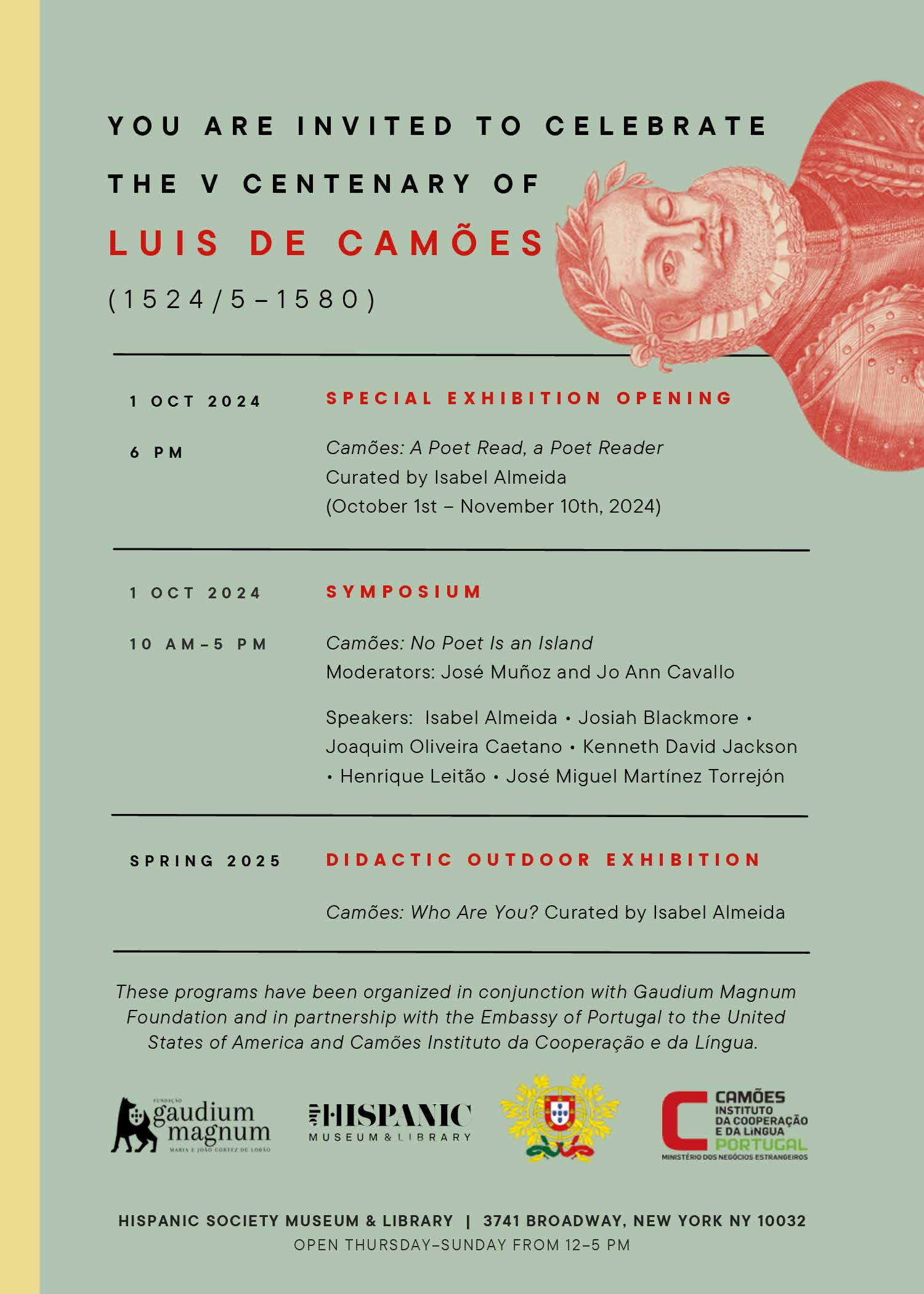
The Gaudium Magnum Foundation is a nonprofit based in Lisbon, Portugal, dedicated to supporting culture, education, and research while actively participating in charitable initiatives. The foundation invests in culture, leveraging its remarkable ability to build bridges and foster dialogue, and acting as an ambassador of Portugal’s national cultural heritage.
Founded by Maria and João Cortez de Lobão in 2018, the foundation supports museums, research, and education centers, promoting projects that highlight the value of cross-cultural exchange in shaping national cultural identities during the Early Modern age, with a special emphasis on Portugal’s role on the global stage. It encourages inter-institutional partnerships and manages a growing collection of European old master works, which is available for lending.
Learn more about the Foundation here.
Past Programs:
“Literary Travels: Book Arts Program with Ana Cordeiro”
Saturday, October 26th, 2024 | 4 to 6pm
“Camões: No poet is an island”
Tuesday, October 1st, 2024 | 10am to 6pm
A symposium that aimed to show that this famous poet — a symbol of a changing world – spoke to all eras and that his words deserve global recognition. Contextualizing Camões offers an opportunity to delve into the cultural dynamics of the sixteenth century and to highlight the significant contributions of European humanists and artists during this fascinating period.
The invited guests were:
- David Kenneth Jackson, Lecturer in Portuguese at Yale University
- Joaquim Oliveira Caetano, Director of the Museu Nacional de Arte Antiga (Portuguese Museum of Ancient Art)
- Josiah Blackmore, Chair Department of Romance Languages and Literatures, Nancy Clark Smith Professor of the Language and Literature of Portugal
- José Miguel Martínez Torrejón, Distinguished Professor at Queens College
- Isabel Almeida, Associate Professor Faculdade de Letras, Lisbon University
- Henrique Leitão, Provost and Senior Researcher, University of Lisbon
“Metamorphoses: the shape of books and the fortune of texts”
A book exhibition curated by Isabel Almeida displayed in the Sorolla Gallery.
This exhibition showcased the eloquence of printed books’ materiality by presenting The Lusiads in both the monumental scale of Faria e Sousa’s edition and the small, portable format of Craesbeck’s typography. It also offered visitors a glimpse into the legacy of Camões’ work by highlighting translations from the 16th century (all printed in Spain) and the 17th century. This exhibition allowed visitors to observe the forms and rhythms of censorship during these periods.



